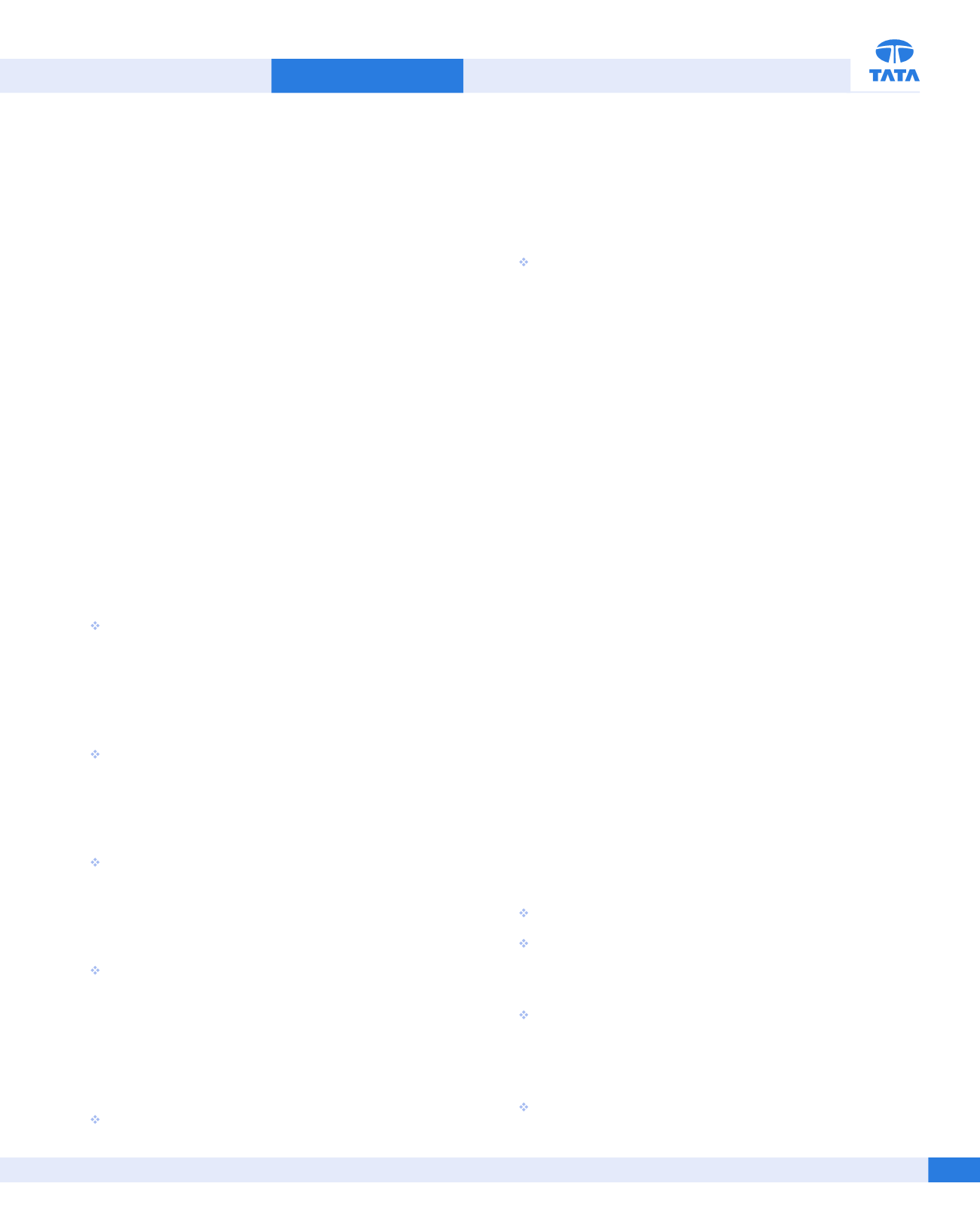

Notice
Board’s Report
Corporate Governance Report
Business Responsibility Report
Management Discussion & Analysis
167
FINANCIAL PERFORMANCE OF TATA TECHNOLOGIES LTD
The consolidated revenue of TTL in Fiscal 2017 increased 4.4%
to
R
2,801.95 crores, compared to
R
2,683.38 crores in Fiscal 2016.
The profit before tax decreased by 2.3% to
R
452.77 crores in Fiscal
2017, compared to
R
463.53 crores in Fiscal 2016. The profit after tax
decreased by 7.8% to
R
353.59 crores in Fiscal 2017, as compared to
R
383.56 crores in Fiscal 2016.
INTERNAL CONTROL SYSTEMS AND THEIR ADEQUACY
The Company has an adequate system of internal controls in place.
It has documented policies and procedures covering all financial
and operating functions. These controls have been designed to
provide a reasonable assurance with regard to maintaining of proper
accounting controls for ensuring reliability of financial reporting,
monitoring of operations, protecting assets from unauthorized
use or losses, compliances with regulations. The Company has
continued its efforts to align all its processes and controls with
global best practices.
Some significant features of the internal control of systems are:
The Audit Committee of the Board of Directors, comprising
of independent directors and functional since August 1988,
regularly reviews the audit plans, significant audit findings,
adequacy of internal controls, compliance with accounting
standards as well as reasons for changes in accounting policies
and practices, if any;
Documentation of major business processes and testing
thereof including financial closing, computer controls and
entity level controls, as part of compliance programme towards
Sarbanes-Oxley Act, as required by the listing requirements at
New York Stock Exchange;
An ongoing programme, for the reinforcement of the Tata
Code of Conduct is prevalent across the organization. The
Code covers integrity of financial reporting, ethical conduct,
regulatory compliance, conflicts of interest’s review and
reporting of concerns.
State-of-the-art Enterprise Resource Planning, supplier
relations management and customer relations management
connect the Company’s different locations, dealers and
vendors for efficient and seamless information exchange.
The Company also maintains a comprehensive information
security policy and undertakes continuous upgrades to its IT
systems;
Detailed business plans for each segment, investment
strategies, year-on-year reviews, annual financial and operating
plans and monthly monitoring are part of the established
practices for all operating and service functions;
A well-established, independent, multi-disciplinary Internal
Audit team operates in line with governance best practices. It
reviews and reports to management and the Audit Committee
about compliance with internal controls and the efficiency and
effectiveness of operations as well as the key process risks. The
scope and authority of the Internal Audit division is derived
from the Internal Audit Charter, duly approved by the Audit
Committee; and Anti-fraud programmes including whistle
blower mechanisms are operative across the Company.
The Board takes responsibility for the overall process of risk
management throughout the organization. Through an Enterprise
Risk Management programme, the Company’s business units and
corporate functions address risks through an institutionalized
approach aligned to the Company’s objectives. This is facilitated by
internal audit. The Business risk is managed through cross-functional
involvement and communication across businesses. The results of
the risk assessment are presented to the senior management. The
Risk Management Committee reviews business risk areas covering
operational, financial, strategic and regulatory risks.
During Fiscal 2017, the Company conducted an assessment of the
effectiveness of the Internal Control over Financial Reporting and
has determined that the Company’s Internal Control over Financial
Reporting as at March 31, 2017 is effective.
HUMAN RESOURCES / INDUSTRIAL RELATIONS
The Company considers its human capital a critical factor to its
success. Under the aegis of Tata Sons and the Tata Sons promoted
entities, the Company has drawn up a comprehensive human
resource strategy, which addresses key aspects of human resource
development such as:
The code of conduct and fair business practices;
A fair and objective performance management system linked
to the performance of the businesses which identifies and
differentiates employees by performance level;
Creation of a common pool of talented managers across
Tata Sons and the Tata Sons promoted entities with a view
to increasing their mobility through job rotation among the
entities;
Evolution of performance based compensation packages to


















